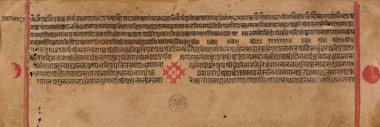Thirtieth Lecture: The Road of Penance
Now hear with concentrated mind, how a monk destroys by austerities the bad Karman which he had acquired by love and hatred. (1)
By abstaining:
- from destroying life;
- from lying;
- from taking anything which is not given;
- from all sexual indulgence;
- from having any property;
- from eating at night, the soul becomes free from āsravas.[1] (2)
By possessing the five Samitis and the three Guptis, by freedom from passions, by subduing the senses, by vanquishing conceit,[2] and by avoiding delusions, the soul becomes free from āsravas. (3)
Hear attentively how a monk destroys (the Karman) acquired by love and hatred in the absence of the above-mentioned (virtues). (4)
As a large tank, when its supply of water has been stopped, gradually dries up by the consumption of the water and by evaporation, so the Karman of a monk, which he acquired in millions[3] of births, is annihilated by austerities, if there is no influx of bad Karman. (5, 6)
Austerities are of two kinds: external and internal; external austerities are of six kinds, and internal are of six kinds.[4] (7)
External austerities are:
- anaśana, fasting;
- avamōdarikā, abstinence;[5]
- bhikṣācharyā, collecting alms;
- rasaparityāga, abstention from dainty food;
- kāyaklēśa, mortification of the flesh;
- saṃlīnatā, taking care of one's limbs.[6] (8)
-
Fasting is of two kinds:
- itvara, temporary, and
- maraṇakāla, fasting which precedes, and ends with death.
Temporary fasting is either such in which a desire (for food) is present, or such in which no such desire exists. (9)
-
The temporary fasting is briefly of six kinds:
- in the form of a line;[7]
- in the form of a square;
- in the form of a cube;
- of a sixth power;
- of a twelfth power;
- of any arrangement.
Temporary fasting (can be practised) for different objects which one has in mind. (10, 11)
-
Fasting which is to precede death, is of two kinds with regard to the motions of the body: with change (of position) and without change. (12)
And again it is twofold: admitting of relief,[8] or not; one may either leave the place (which one has chosen to die in), or not leave it; in both cases one may not take any food. (13)
-
Abstinence is briefly of five kinds: with regard to:
- substance;
- place;
- time;
- state of mind;
- development. (14)
- He who takes less food than he usually does,[9] in the extreme case but one mouthful, performs abstinence with regard to substance. (15)
- (Place means) a village, a scot-free town,[10] a capital, a camp of merchants,[11] a mine, a settlement of a wild tribe,[12] a place with an earth wall,[13] a poor town,[14] a town with a harbour,[15] a large town,[16] an isolated town,[17] and an open town.[18] (16)
In a hermitage, a vihāra,[19] a halting-place for procession,[20] a resting-place for travellers,[21] a station of herdsmen, a camp on high ground, a caravan's camp, a fortified place of refuge. (17)
In gardens, on roads, in housesall this is meant by place. In these and similar places he may (wander about). In this way he performs abstinence with regard to place. (18)
- pēṭā,
- ardhapēṭā,
- gōmūtrikā,
- pataṅgavīthikā,
- śambūkāvartta,
- āyataṃ-gatvā-pratyāgata.[22] (19)
- Abstinence with reference to time (is observed by him) who goes about in that time of the four Pauruṣīs of the day (which he selects for that purpose). (20)
Or if he collects alms in a part of the third Pauruṣī, or in its last quarter, then he observes abstinence with reference to time. (21)
-
Abstinence with reference to state of mind (is observed by him) who accepts alms from a woman or man, from an adorned or unadorned person, from one of any age or dress, of any temper or colour: if that person does not change his disposition or condition.[23] (22, 23)
-
A monk who observes abstinence according to the particulars which have been enumerated with regard to substance, place, time, and state of mind, observes abstinence with regard to development[24] too. (24)
- With regard to collecting alms there are the eight principal ways[25] how to collect them; the seven ēṣaṇās (or modes of begging) and other self-imposed restrictions. (25)
- Abstention from dainty food means abstention from such highly nourishing[26] food and drink as milk, curds, ghee, etc. (26)
- Mortification of the flesh consists in the different postures as Virāsana, etc., which benefit the soul, and which are difficult to perform. (27)
- Using unfrequented lodgings and beds consists in living and sleeping in separate and unfrequented places where there are neither women nor cattle. (28)
Thus external austerities have been briefly explained; I shall now explain internal austerities in due order. (29)
Internal austerities are:
- prāyaśchitta, expiation of sins;
- viṇaya, politeness;
- vaiyāvṛtya, serving the Guru;
- svādhyāya, study;
- dhyāna, meditation;
- vyutsarga,[27] abandoning of the body. (30)
- Expiation of sins is tenfold, what must be confessed,[28] etc.; this is to be strictly observed by a monk; this is called expiation of sins. (31)
- Politeness consists in rising (from one's seat), folding of the hands, offering of a seat, loving the Guru, and cordial obedience. (32)
- Study is fivefold:
- saying or learning one's lesson;
- (questioning the teacher about it);
- repetition;
- pondering;
- religious discourse. (34)
- Abstaining to meditate on painful and sinful things,[31] one should, with a collected mind, engage in pure meditations on the Law; this the wise call meditation. (35)
- If a monk remains motionless when lying down, sitting, or standing upright, this is called abandoning of the body, which is the sixth kind (of internal austerities). (36)
If a sage truly performs these two kinds of austerities, he will soon be thoroughly released from the Circle of Births. (37)
Thus I say.
Comp. Aupapātika Sūtra, ed. Leumann, p. 38 ff. The general division is the same, but the subdivision differs in many details.
The meaning of this singular statement is as follows. If four fasts of two, three, four, and five days are performed in this order, they form a line. If this set of fasts is four times repeated, each time beginning with a different number, we get sixteen fasts; they form a square, viz.:
1. 2. 3. 4
2. 3. 4. 1
3. 4. 1. 2
4. 1. 2. 3
The next class contains 64 fasts, the fourth 4,096, the fifth 16,777,216 fasts. Fasts of the last class require 700,000 years at least, and must be assumed to be restricted to former Tīrthakaras, whose lives lasted enormous periods of time.
Saparikarma = vaiyāvṛtyasahita. This leads to iṅginīmaraṇa and bhaktapratyakhyāna; the aparikarma to pādapōpagamana (i.e. prāyōpagamana); comp. part i, p. 72.
Thirty-two mouthfuls is the usual quantity of food of men, twenty-eight that of women. A mouthful is of the size of an egg.
Karvaṭa. According to the dictionary, it means "market-town"; but the commentators render it by kunagara, or say that it is karvaṭajanāvāsa, the dwelling-place of the Karvaṭa people.
These are terms for different kinds of collecting alms; it is called pēṭā (box), when one begs successively at four houses forming the corners of an imaginary square; gōmūtrikā, when he takes the houses in a zigzag line; pataṅgavīthikā (cricket's walk), when he goes to houses at a great distance from one another; śambūkāvartta (the windings of a conch), when he goes in a spiral line, either toward the centre (abhyantara) or from the centre outward (bahis); āyataṃ-gatvā-pratyāgata, when he first goes straight on and then returns.
I give the traditional explanation of the verses, as handed down in the commentaries. If we might set it aside, I should translate: abstinence with reference to disposition is observed by him who in collecting alms preserves the same disposition, whether he has to do with a woman or man, etc.
For development (pajjava = paryāya) denotes any form or phase of existence which anything can assume. Therefore all particulars of place, e.g. are developments of Place. As all restrictions of place, etc., indirectly diminish the food obtainable by a monk, they also come under the head Abstinence.
- saṃsaṭṭhā;
- asaṃsaṭṭhā;
- uddhaḍā;
- alpalēpikā;
- udgṛhītā;
- pragṛhītā;
- ujjhitadharmā.
- is saṃspṛṣṭa,
- uddhrita,
- avagṛhīta.
Viōsagga, viussaga, viusagga. It is usually rendered vyutsarga, but the Sanskrit prototype is vyavasarga, as Leumann has pointed out, l.c., p. 152.
 Ganadhar Sudharma Swami
Ganadhar Sudharma Swami
